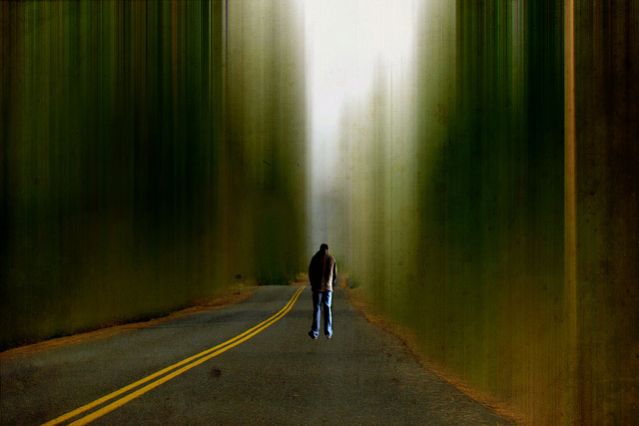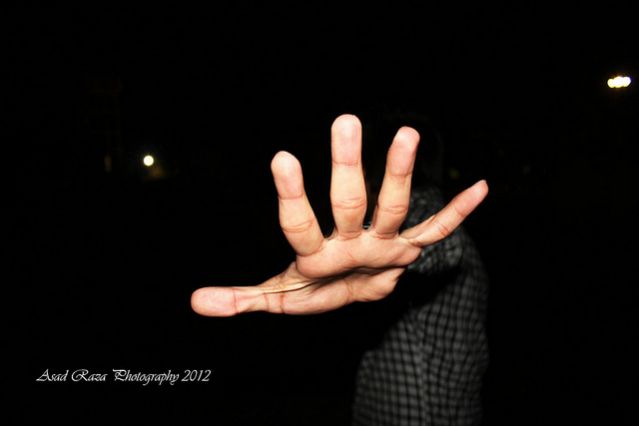
Loneliness
Seeking Solitude but Finding Loneliness: Five Wrong Turns
Have you ever gone looking for time alone--but ended up lonely instead?
Posted June 19, 2015

As I start this entry, I’m sitting on a grungy futon in a hotel room. This looks like one of those places that was appealing years ago, but now it feels timeworn and neglected. There are stains on the upholstery and scratches on the woodwork, and parts of the carpet have been torn.
Despite the sun that shines brightly outside my window, a sense of loneliness settles in around me like a damp, chill fog. I feel a dull ache in my gut. I’ve been trying to fight it off all day...but here it is again.
As an introvert, I can get fatigued by heavy-duty social interactions, especially when they involve unfamiliar people, large groups, and needs that I can’t meet. In past entries I've described how days that are packed with these types of exchanges can leave me feeling emotionally drained and yearning for an escape into solitude...and I know that many of you feel the same way. If we are at home or work, a closed door for a brief time might be all that it takes. If traveling, we might look for a chance to venture out away from the group, going for a drive or a walk on our own, unfettered. And usually this quiet time pays off. It recharges our batteries and helps us feel ready to be with people again.
Recently, though, I’ve been learning that this quest for time alone can be a gamble. Sometimes, when all that I’m seeking is a little solitude, I can take a wrong turn somewhere and find myself way out in a lonely place—a stark, cold, barren place. It’s like an unwelcome eclipse, blocking out any sense of pleasure. Because I was actually seeking time by myself, the loneliness catches me off guard. I’m surprised by the dark pain when it sneaks up and overtakes me.

Having had several of these experiences lately, I’ve wanted to get a better handle on this distinction between solitude and loneliness. Solitude refers simply to a state or situation in which you are alone, and it often conveys an element of choosing to be alone. Loneliness, on the other hand, implies a feeling of being cut off from others, of being without company, producing a feeling of sadness, bleakness or desolation.
In reflecting on my own recent experiences, I can see that I took at least five wrong turns that led me away from solitude and toward loneliness:

1) Grasping instead of freedom. Times of solitude release us from the demands of social interaction. At least temporarily, we can release that part of ourselves that feels the need to respond to other people. In solitude experiences, we can savor the sense of freedom that comes with privacy. But with loneliness, any sense of freedom is overshadowed by clinging and grasping: We are wishing, longing for someone to share an experience with us—but that someone is not there. This longing can become so intense that we find ourselves unable to enjoy the experience in the absence of this other person(s). And this longing itself can start to shackle us, because we‘re making our peace and our pleasure dependent on external circumstances—circumstances that we may not be able to change.
2) Sense of alienation (vs. connection). One surprising thing about solitude is that it can actually bring a strong sense of connection. Even while physically alone, we might feel a strong sense of connection to other living things, to God or the universe. We can also feel close to friends or loved ones who are not with us—perhaps as we imagine telling them about the experience or bringing them to this place at some future time. Loneliness, in contrast, brings a sense of alienation and disconnection. We feel cut off from others. And when we look past our yearning, we might note that many of the thoughts that we’re having about others have a sour aftertaste: We think about who’s NOT there, who does NOT care, how it’s NOT fair.

3) Wandering mind (not engaged in the moment). One of the great gifts of solitude is being able to fully engage in the present moment. When there’s no need to respond to anyone else—or to worry about how they might be perceiving you—your mind is more free to quiet itself, to take a temporary break from its wandering, to focus on whatever is going on right now. But lonely thoughts reliably pull us out of the present moment. Even though we might be in a beautiful or interesting location, our preoccupations cause us to mentally exit. We sink back into the past, regretting poor choices or trying to recapture the good old days. We mentally fling ourselves into the future, worrying about whether others will reject us or fretting about how long we’ll be alone. Or we plunge headlong into the watery world of fantasy, dreaming about those who we wish were with us. And as our minds paddle around in circles, churning out more agitation and yearning, we miss what’s available to us here and now.
4) Rumination, not reflection. Solitude doesn’t require that we focus only on the present moment. It can also provide us with space to reflect, to mentally sift through our ideas, memories, desires, and plans for the future. This process can be profoundly satisfying, especially when we have a strong need to process something. But with loneliness, reflection is replaced by rumination and intrusive thoughts. Rather than having that enjoyment of playing around with ideas or plans, our dark thoughts and unmet desires seem to take over our thinking and are now running the show.

5) Sense of deficit (vs. gratitude). In the sweetest moments of solitude, we are able to focus our attention on appreciating what we already have. We enjoy whatever is available to us, which might include beautiful things to see, the warmth of the sun, the right music for our current mood, or helpful things to think about. There is a sense of gratitude and abundance: This is enough, and I am happy with what I have right now. In contrast, loneliness reflects a deficit mentality: Our minds are focused on what we lack. The glass is half empty. When we are lonely, we crave the company or attention of a companion, someone who is not there.
And herein lies the bummer: As we reach out for that person who is not there, what we pull back toward ourselves instead is pain: Yearning. Frustration. Grief. And as we draw these dark emotions toward ourselves, any potential sweetness of the moment is lost. It has turned sour and bitter.

It’s strange how we can set out looking for something perfectly reasonable and healthy—some space for ourselves, a little privacy, freedom from social obligations—and end up in such a dark place. In my next entry, I'll offer some ideas about coping with loneliness.



